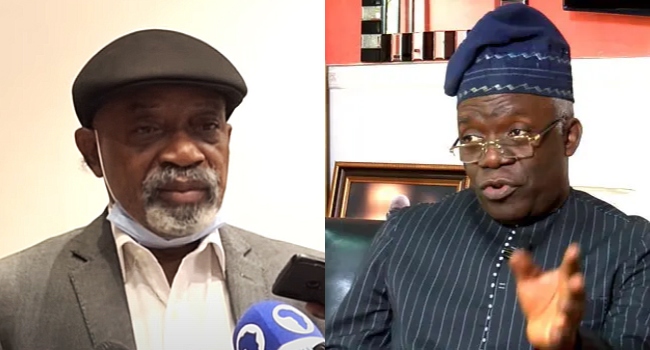By Simeon OSAJIE
Following the eight-month nationwide industrial action by the Academic Staff Union of Universities (ASUU) last year, Femi Falana SAN, has faulted the move by the Minister of Labour and Employment, Chris Ngige, to facilitate the payment of withheld salaries of some lecturers at the Nnamdi Azikiwe University (UNIZIK), Awka.
In a letter dated March 30, Ngige had asked the Minister of Finance, Budget and National Planning, Zainab Ahmed, to pay 204 lecturers of medical faculties at UNIZIK their withheld salaries.

Specifically, the minister said records jointly signed by the deans of medical science, basic clinical sciences, and basic medical sciences faculties respectively at UNIZIK showed that the said lecturers performed their duties while the strike lasted.
According to him, this claim was strengthened by the vice-chancellor of the institution as well as independent findings of the Labour Ministry’s state controller in Anambra.
But this did not go down well with Falana who is the counsel of ASUU. The human rights lawyer argued that the minister’s action contradicts the law.
He said that contrary to Ngige’s claim, the entire lecturers of UNIZIK joined the eight-month strike last year.
“Ngige has convinced the federal government not to pay ASUU members for embarking on strike in 2022. But he has decided to isolate his colleagues in his home state for special favour by causing their salaries to be paid for the period of the same strike.
“Ngige took similar action when members of the National Association of Resident Doctors embarked on strike in 2021. The federal government paid the salaries of the resident doctors for the period of their strike.
“The actions of the minister run contrary to the provision of Section 42(1) of the constitution of the Federal Republic of Nigeria 1999 and article 2 of the African Charter on Human and Peoples Rights (Ratification and Enforcement) Act, Cap A9, laws of the Federation of Nigeria, 2004 which have prohibited any form of discrimination in the application of the law or policy of the government,” Falana said.
